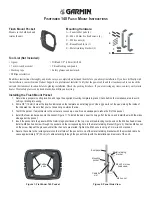
37
Zoom Page
Operating Instructions
Press
Zoom display
(magnified)
Normal
display
Bottom of
zoom area
Line indicates
zoom area
Fig. 3-7
Zoom Page
Top of zoom
area
Zoom
magnification
The Zoom page gives you a way of enlarging or magnifying a part of the
display area. See Fig. 3-7. (The “zoomed” display is actually larger only
in the vertical direction.) The right side of the display shows the same
information as the FishFinder page. The left side shows the magnified
view. In each case, the new information appears at the right edge of the
display, and moves to the left.
Many of the items on the Zoom page are the same as those on the
FishFinder page. There are a few new items.































